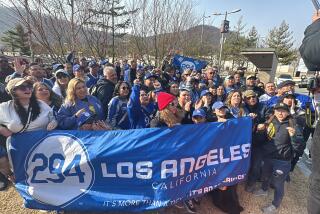South Korea’s Incheon is a vacation from other airports
- Share via
Reporting from Seoul — Jeff Kreiser goes places. The Sacramento-based minister has been whisked off to too many countries to count, dragging his luggage through airports that make him feel as though he’s landed in purgatory.
Many of them, he says, feel less like modern conduits to the sky and more like cattle yards where jet-lagged passengers are herded through dimly lighted corridors and nickel-and-dimed for even minor conveniences such as luggage carts and clean restroom stalls.
Then he stepped off a flight at Seoul’s Incheon International Airport.
Passengers slumbered on comfy loungers. Others enjoyed free public computers and Internet access, no-charge showers and luggage carts. Some watched a performance of traditional music at a cultural center, or placed bets at a casino.
Wandering the gates were Wal-Mart-style greeters assisting lost souls who didn’t speak Korean.
There were numerous computer kiosks that, with a swipe of a plane ticket, displayed an easy-to-read map showing a passenger the path and transit time to the gate.
“These are the things that make a traveler feel welcome in a strange land,” Kreiser, 44, said. “It’s an airport that’s extending a hand to say, ‘Thanks for coming. We’re glad you’re here.’ ”
Located on an island of reclaimed wetlands not far from the site of Gen. Douglas MacArthur’s first allied assault in the Korean War, Incheon is the scene of a new offensive: Opened in 2001, the airport has set its sights on becoming Asia’s premier air hub, overtaking competitors in Japan, Singapore and Hong Kong.
And by 2020, officials here want to redefine airport services to match those of an average city. On land the size of Manhattan, there are plans to construct a theme park, a yacht marina, designer studios, a fashion runway, a convention center, and a hospital complex to capitalize on medical tourism.
“Airports should be more than a place for takeoff and landing,” spokesman Doh Gun-ho said. “Our idea was to build an airport city.”
The other day, Atul Chadha, 42, a San Jose computer analyst, sat at a table in the cultural center, painting a miniature model of a traditional Korean cabinet.
“This is a place where even the budget traveler can relax, take a shower, eat a nice meal and unwind,” he said, dabbing red paint on his model. “I rarely get a chance to do cultural things at airports.”
Now officials have begun to export their airport expertise. They are advising Irbil International Airport in Iraq and are looking for other clients.
During its infancy, Incheon sent employees to competitor airports to secretly observe them, appraising new facilities and practices to incorporate back home.
“Now,” Doh said, “the spies come to us.”
Ju-min Park of The Times’ Seoul Bureau contributed to this report.
More to Read
Sign up for The Wild
We’ll help you find the best places to hike, bike and run, as well as the perfect silent spots for meditation and yoga.
You may occasionally receive promotional content from the Los Angeles Times.







